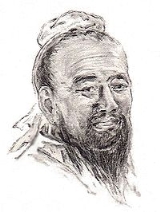
Zhuangzi
庄子 or 莊子 Zhūangzi literally Master Zhuang, was a Chinese philosopher, who is supposed to have lived during the Warring States Period, corresponding to the Hundred Schools of Thought. His name is also transliterated as Zhuang Zi, Zhuang Zhou, Chuang Tzu, Chuang Tse and Chuang Chou.
Sourced
Zhuangzi
- Quotations sourced to the book known as Zhuangzi:
- Once upon a time, I, Chuang Chou, dreamt I was a butterfly, fluttering hither and thither, to all intents and purposes a butterfly. I was conscious only of my happiness as a butterfly, unaware that I was Chou. Soon I awaked, and there I was, veritably myself again. Now I do not know whether I was then a man dreaming I was a butterfly, or whether I am now a butterfly, dreaming I am a man. Between a man and a butterfly there is necessarily a distinction. The transition is called the transformation of material things.
- As translated by Lin Yutang; Alternate translations:
Once Zhuang Zhou dreamed he was a butterfly, a fluttering butterfly. What fun he had, doing as he pleased! He did not know he was Zhou. Suddenly he woke up and found himself to be Zhou. He did not know whether Zhou had dreamed he was a butterfly or a butterfly had dreamed he was Zhou. Between Zhou and the butterfly there must be some distinction. This is what is meant by the transformation of things.
One night, Zhuangzi dreamed of being a butterfly — a happy butterfly, showing off and doing things as he pleased, unaware of being Zhuangzi. Suddenly he awoke, drowsily, Zhuangzi again. And he could not tell whether it was Zhuangzi who had dreamt the butterfly or the butterfly dreaming Zhuangzi. But there must be some difference between them! This is called 'the transformation of things'.
- As translated by Lin Yutang; Alternate translations:
- How do I know that enjoying life is not a delusion? How do I know that in hating death we are not like people who got lost in early childhood and do not know the way home? Lady Li was the child of a border guard in Ai. When first captured by the state of Jin, she wept so much her clothes were soaked. But after she entered the palace, shared the king's bed, and dined on the finest meats, she regretted her tears. How do I know that the dead do not regret their previous longing for life? One who dreams of drinking wine may in the morning weep; one who dreams weeping may in the morning go out to hunt. During our dreams we do not know we are dreaming. We may even dream of interpreting a dream. Only on waking do we know it was a dream. Only after the great awakening will we realize that this is the great dream. And yet fools think they are awake, presuming to know that they are rulers or herdsmen. How dense! You and Confucius are both dreaming, and I who say you are a dream am also a dream. Such is my tale. It will probably be called preposterous, but after ten thousand generations there may be a great sage who will be able to explain it, a trivial interval equivalent to the passage from morning to night.
- Right is not right; so is not so. If right were really right it would differ so clearly from not right that there would be no need for argument. If so were really so, it would differ so clearly from not so that there would be no need for argument.
- "Discussion on Making All Things Equal"; Variant: If right were really right, it would be so different from not-right that there would be no room for argument. If so were really so, then it would be so different from not-so that there would be no room for argument.
- Forget the years, forget distinctions. Leap into the boundless and make it your home!
- "Discussion on Making All Things Equal"
- A trap is for fish: when you've got the fish, you can forget the trap. A snare is for rabbits: when you've got the rabbit, you can forget the snare. Words are for meaning: when you've got the meaning, you can forget the words. Where can I find someone who's forgotten words so I can have a word with him?...
- XXVI External Things
- A frog in a well cannot conceive of the ocean.
- Of a person who has limited life experience and hence world view; see 井底之蛙.
- From 莊子/秋水.
- The wise man looks into space and does not regard the small as too little, not the great as too big, for he knows that, there is no limit to dimensions.
- From 莊子/秋水.
